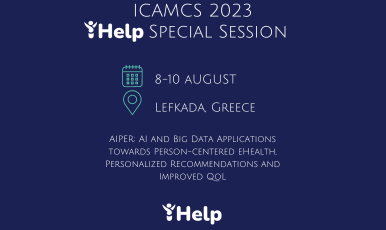
- This event has passed.
ICAMCS 2023 iHelp Special Session
August 8, 2023 - August 10, 2023

AIPER: AI and Big Data Applications towards Person-centered eHealth, Personalized Recommendations and Improved QoL
Introduction
The successful exploration and interpretation of all health-related data play a vital role [1]. Healthcare data are available in different forms (e.g., images, signals, wavelengths, etc.). All these data may come from different healthcare entities (i.e., patients themselves, healthcare professionals, etc.), where more and more entities place data demands on other entities, and many healthcare organizations find themselves overwhelmed with data, but lacking truly valuable information. At the same time, the use of electronic health records (EHRs) enables the management of patient data, for health care as well as other purposes, across any kind of institutional, regional, or national border. Data can thus be shared and used more effectively for quality assurance, disease surveillance, public health monitoring, and research [2]. On top of that, a crucial role in the huge expansion of healthcare data play the utilization of the Internet of Things (IoT) and of wearable and mobile devices. The collection of data from such sources, called secondary data, and their integration with primary (historical, medical) data is of the highest importance in modern eHealth [3]. Most AI-based prevention and intervention care models and associated clinical decisions exploit minimal amounts of the patients’ personal data (e.g., part of the patient’s medical history). Hence, other important data sources for personalized, patient-centric clinical decisions (e.g., lifestyle and behavioral data, real-world data (RWD), genetics, and genomics) are largely underexploited. Lack of integrated data (e.g., lifestyle data, Patient-Reported Outcome Measures (PROMs), Patient Reported Experience Measures (PREMs), and genomic data) from patients that would allow clinicians to make personalized treatment decisions as part of their clinical decisions limits the effectiveness of prevention and intervention strategies, the potential of patient-centric interactions between HCPs, healthcare authorities, patients, and caregivers [4]. Likewise, many treatment protocols for many diseases target the prolongation of the patient’s life, while ignoring the patient’s Quality of Life (QoL) and well-being as perceived by the patient themselves [5]. Timely diagnosis is critical in the modern healthcare domain, as early detection allows for accurate planning and the implementation of appropriate and personalized interventions and treatments to improve the Quality of Life (QoL) of the affected individuals. Early identification of modifiable risk factors relies on healthcare professionals (HCPs) to possess sufficient and integrated knowledge, appropriate care programs, and evidence-based approaches towards specialized, multidisciplinary services both in terms of prevention and diagnosis of diverse health-related factors. Lack of integrated knowledge bases and the existence of fragmented healthcare data results in a limited understanding of underlying causal risk factors for several diseases. Moreover, a significant gap remains between the delivery of stratified healthcare leading to personalization as current approaches often take a one-size-fits-all approach. Personalization implies a level of precision that seeks to treat the patient as opposed to the disease, taking into account as an example comorbidities, genetic predisposition, and environmental factors. To address these challenges the potential of advanced technologies (i.e., Artificial Intelligence (AI), Big Data, and Ambient Assisted Living (AAL)) for accurate risk prediction, prevention, and intervention should be examined. The utilization of such advanced technologies coupled with the introduction of data spaces and integrated knowledge bases will foster and enhance the delivery of personalized recommendations, prevention and intervention measures, and the introduction of long-lasting behavioral and lifestyle changes.
Aim of the Special Session
A crucial role in the huge expansion of healthcare data play the utilization of the Internet of Things (IoT) and wearable and mobile devices. However, there is a lack of integrated primary and secondary data from patients that would allow clinicians to make personalized treatment decisions. In addition, a significant gap remains between the delivery of stratified healthcare leading to personalization as current approaches often take a one-size-fits-all approach, while also ignoring the patient’s Quality of Life (QoL). The special session will focus on research and development efforts in the domain of eHealth and the introduction of emerging AI and Big Data solutions required to overcome these lacks, driven by the research outcomes in the framework of an EU-funded project, iHelp [6].
Topics
In this context, the aim of this Special Session is to present research results on technologies, tools, and methods that support the development, deployment, and operation of advanced AI and Big Data systems. The main topics of interest include, but are not limited to:
- Standardization, harmonization, and interoperability of healthcare data
- Integrated Health Records
- AI tools for enhanced personalized recommendations
- Patient Digital Twins (PDTs)
- Dialogue Language and Platforms targeted at eHealth applications
- Virtual Health Coaches and Agents
- Fuzzy Cognitive Maps (FCMs) on personalized eHealth
- Explainable AI (XAI) techniques in the eHealth
- Clinical Decision Support Systems (CDSS)
- Integrated Care Model Libraries of AI Algorithms
- Health Data Spaces
- Integrated Healthcare Knowledge Bases
- Blockchain-based Data Exchange and Management in eHealth
- Robotic Systems Improving QoL
- Personalized monitoring and alerting eHealth solutions
- Delivery Mechanisms for Personalised Healthcare, Real-time Feedback, and Behavioural Analytics
- Serious Games and Gamification (SGG) approaches towards personalization of prevention and intervention measures
- Future research challenges in eHealth
For Authors
This special session will only accept review original papers that have not been previously published. Papers must be prepared in English and should be formatted based on according to the conference and IEEE proceedings guidelines (available here); two-column Manuscript Templates for Conference Proceedings with a maximum allowed camera-ready paper length of eight (8) printed pages including text, figures, and references.
Authors should send their manuscripts directly to gmanias@unipi.gr and dimos@unipi.gr to ensure that their manuscripts will be reviewed and published in the context of the Special Session.
Accepted papers will be published in the ICAMCS conference proceedings by the CPS, will be indexed by several platforms, such as IEEEXplore, Google Scholar, ISI/CPCI, Scopus, etc. (http://www.icamcs.co/submit.html) and will also be presented directly in the Special Session. All papers will be reviewed and evaluated by independent experts and selected based on their originality, merit, and relevance to the special session.
Fees
- 320€ for publication of one paper in the IEEE Proceedings of ICAMCS 2023. More info here. All papers should not exceed the maximum length of eight (8) pages.
- For extra paper from the same author, the fee is 160€.
The Special Session submission link is here.
Important Dates
- Paper submission deadline: July 23rd, 2023
- Acceptance notification: July 25th, 2023
- Camera-ready deadline: July 29th, 2023
- Registration deadline: July 31st, 2023
- Special Session Days: August 8th-10th, 2023
The Special Session will be held in the context of the ICAMCS conference from the 8th to the 10th of August in Lefkada, Greece.
Special Session Format and Agenda
The special session will be initiated by a demo application and presentation, entitled “Clinical DSS and AI models for personalized recommendations and measures to raise awareness of relevant factors of pancreatic cancer” highlighting requirements and needs towards personalized eHealth solutions. Two talks will be provided by invited speakers, followed by accepted paper presentations.
Invited speakers
We have confirmed the participation of the following invited speakers with expertise within the field of AI-based personalized healthcare applications both from technical and medical perspectives:
- Prof. Tanja Tomson, Karolinska Institutet (tanja.tomson@ki.se)
- Dr. Pavlos Kranas, LeanXcale, Spain (pavlos@leanxcale.com)
Special Session chairs
- Mr. George Manias: Department of Digital Systems, University of Piraeus
- Prof. Dimosthenis Kyriazis: Department of Digital Systems, University of Piraeus


References
[1] Jayaraman, P. P., et al., (2020). Healthcare 4.0: A review of frontiers in digital health. Wiley Interdisciplinary Reviews: Data Mining and Knowledge Discovery, 10(2), e1350.
[2] Atasoy, H., Greenwood, B. N., & McCullough, J. S. (2019). The digitization of patient care: a review of the effects of electronic health records on health care quality and utilization. Annual review of public health, 40, 487-500.
[3] Carroll, J. K., Moorhead, A., Bond, R., LeBlanc, W. G., Petrella, R. J., & Fiscella, K. (2017). Who uses mobile phone health apps and does use matter? A secondary data analytics approach. Journal of medical Internet research, 19(4), e125.
[4] Yaqoob, I., Salah, K., Jayaraman, R., & Al-Hammadi, Y. (2021). Blockchain for healthcare data management: opportunities, challenges, and future recommendations. Neural Computing and Applications, 1-16.
[5] Lorkowski, J., Grzegorowska, O., & Pokorski, M. (2021). Artificial intelligence in the healthcare system: An overview. Best Practice in Health Care, 1-10.
[6] G. Manias et al., “iHELP: Personalised Health Monitoring and Decision Support Based on Artificial Intelligence and Holistic Health Records,” 2021 IEEE Symposium on Computers and Communications (ISCC), 2021, pp. 1-8, doi: 10.1109/ISCC53001.2021.9631475.
